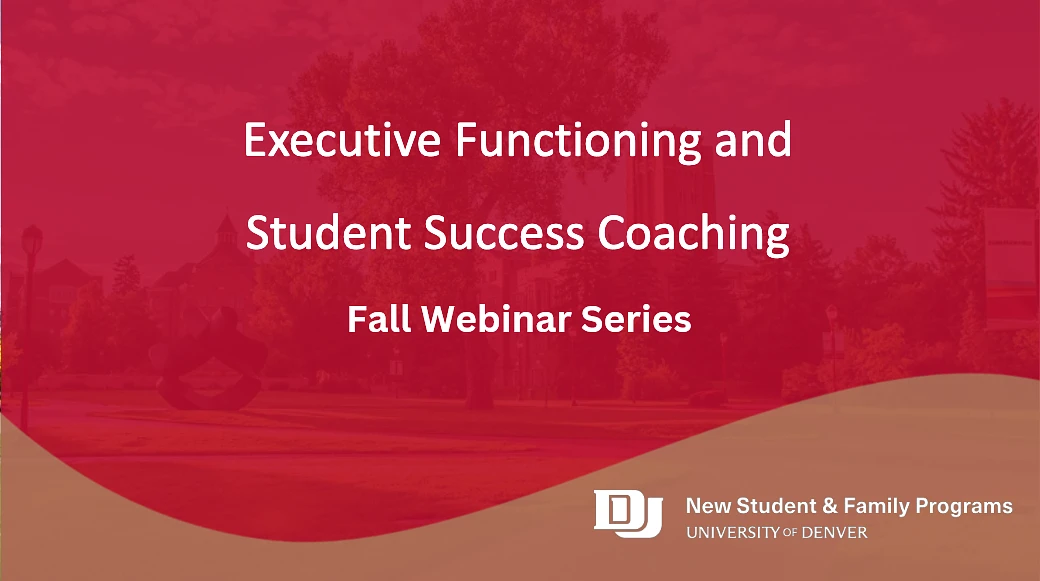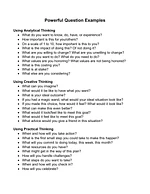Webinar Summary: The Impact of Student Success Coaching and Parental Support through Powerful Questions
On Thursday, October 3rd, we hosted our first Fall webinar focused on the transformative role of student success coaching for college students and the pivotal ways parents can positively impact their child's academic journey through strategic communication. Student Success Coaching is free to all DU students. We also had the chance to hear from the Learning Effectiveness Program (LEP) to learn more about the fee-based program offering additional supports to neurodivergent students.
Key Highlights:
- Understanding Student Success Coaching:
- Role and Benefits: Student success coaching was defined as a personalized, collaborative process designed to help students identify and achieve academic and personal goals. Coaches provide guidance on time management, motivation, goal setting, and overcoming challenges. Studies suggest that students who engage with success coaching often exhibit improved academic performance, enhance personal development, and show greater resilience.
- Empowerment and Accountability: The near-peer coaching relationship empowers students to take ownership of their educational experience, fostering greater autonomy and accountability. The coach acts as a supportive partner in their journey, helping to clarify goals and develop actionable plans. Because our coaches are first and second year graduate students, the "near-peer" model allows for someone who more recently graduated from college to be guiding the students development.
- Transitioning from High School to College:
- Coaches discus the different challenges students face in transitioning to college life, emphasizing the increased need for self-management compared to the structured environment of high school. Success coaches are instrumental in easing this transition by helping students navigate new academic AND social landscapes.
- The Role of Families:
- Asking Powerful Questions: Families play a crucial supportive role by adopting a curious and open-ended questioning approach. Instead of immediately offering solutions, parents were encouraged to engage their children with questions that inspire reflection and self-discovery, such as "What resource on campus could you use?" or "What do you think will happen if you try that?"
- Facilitating Independence: Through questions, parents can help their children develop critical thinking and problem-solving skills. This approach nurtures self-efficacy and confidence as students learn to trust their judgment and decision-making capabilities. See the attachment below for examples of powerful questions.
- Building a Supportive Environment:
- Recognizing the balance between providing guidance and allowing space for independence is critical in the next stages of supporting an emerging adult child. A nurturing environment where students feel supported yet free to explore their paths significantly contributes to their success
Student Success Coaching Office:
- Website: https://academicaffairs.du.edu/office-academic-advising/student-success-coaching
- Scheduling Website: https://isarsgrid.du.edu/eSARS/SLAcademicAdvisingGRCNSL/eSARS.asp?WCI=Init&WCE=Settings
- Contact: ACE@du.edu or Instagram @dustudentsuccesscoaching
- On-Campus Location: Community Commons Building, third floor the in the Academic Advising Suite
Learning Effectiveness Program (LEP):
A student-driven fee for service academic resource for neurodiverse learning including students with learning differences. The LEP recently celebrated 40 years of serving DU students and is one of the top programs in the US for students with disabilities. They operate on rolling applications and students can pay for services by quarter. Services provided include academic counseling, executive functioning coaching, tutoring in all 1000 and 2000 level courses, events and social skills.
- Website: https://studentaffairs.du.edu/learningeffectiveness
- Contact: lep@du.edu or 303-871-2372
Skip past news feed





